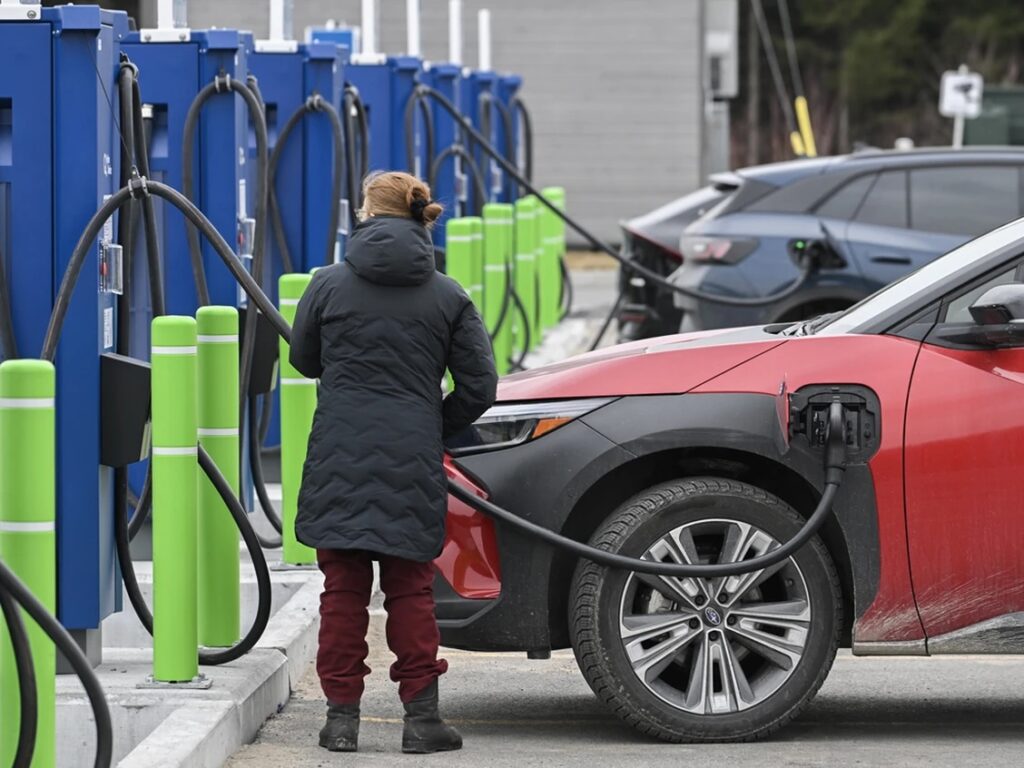
Repeal the EV mandate, Mr. Carney
| By Dan McTeagueEarlier this month, Donald Trump fulfilled a major campaign promise and struck a blow against environmentalist governance in Canada, all in one fell swoop.
He did this by signing a congressional resolution revoking a waiver granted to California by the Biden Administration that enabled the state to set automotive emissions standards significantly stricter than the national standard. So strict, in fact, that in practice only electric vehicles (EVs) could realistically meet them.
This waiver functioned as a backdoor EV mandate, not just in California, but for all of the United States. That’s because automakers don’t want to be locked out of the most populous state in the union but are also disinclined to build one set of cars for California and another for the rest of the country. Their only option would be to increase their production of EVs, to the exclusion of gas-and-diesel internal combustion engine (ICE) vehicles.
Trump has argued, both during his 2024 campaign and since, that the waiver enabled far-left California to saddle the rest of the country with environmental policies it had never voted for and couldn’t repeal. That view helped him win back the White House.
But what does this have to do with Canada? Donald Trump has no power over our own EV mandate. The law of the land in Canada, though it was barely discussed in this spring’s federal election, beyond a last-minute pledge from Pierre Poilievre to reverse it, is still that by 2035, 100 per cent of new light-duty vehicles sold in Canada (including passenger cars, pickup trucks, and SUVs) must be electric.
It doesn’t sound like Mark Carney’s Liberals have any intention of changing course from this Trudeau-era policy — even though new EVs sold in Canada have been falling as a share of overall purchases. To stay on track for 2035, the mandate stipulates, 20 per cent of new cars sold in Canada next year must be EVs. Last year just 13.7 per cent were. And, as Tristin Hopper noted recently, “these sales are disproportionately concentrated in a single province … Of the 81,205 zero-emission vehicles sold in Canada in the last quarter of 2024, 49,357 were sold in Quebec.”
That doesn’t bode well for a national mandate. And Trump’s move further complicates the Liberals’ EV mandate, which has always been presented as an investment opportunity as well as a chance to reduce global carbon emissions. Our federal and provincial governments (particularly Ontario and Quebec) have bet very big on EVs dominating the future. Last year, the Parliamentary Budget Officer estimated that public investment in EVs exceeded $52 billion. Much of that money has gone towards subsidizing the manufacture of EVs in Canada.
Except there just aren’t enough Canadian consumers to justify that expense. The scheme has always hinged on there being a robust EV market south of the border. The Canadian Vehicle Manufacturers Association reminds us that “vehicles are the second largest Canadian export by value, at $51 billion in 2023, of which 93 per cent was exported to the U.S.”
The assumption was that existing avenues of trade would remain essentially unchanged. Even leaving aside concerns about what our future trade relationship with the United States will be, the end of America’s backdoor mandate — and with it, any reason to believe there will be a serious market for EVs in the U.S. — exposes our current EV policies as a bum deal.
Of course, there was never a strong case for attempting to turn Canada into a global EV superpower. There’s a reason Canadian consumers remain skeptical of them. EV batteries don’t perform well in the frigid temperatures for which our country is famous. In cold weather, they charge slowly and then struggle to hold the charge.
Our already-stressed electrical grid isn’t ready for the extra demand that would come with widespread EV adoption, especially considering the Liberals’ desire to progressively decarbonize the grid. And we have nothing like the infrastructure we would need to support this transition.
These roadblocks have now become so obvious that even the automakers, the main beneficiaries of both taxpayer-funded largesse and the mandates themselves, have started saying so. “The fact is these EV sales mandates were never achievable,” read a recent statement by the Alliance for Automotive Innovation, which represents Toyota, GM, Volkswagen, and Stellantis. Ford Canada CEO Bev Goodman has described the mandate as unrealistic and called for its repeal. Kristian Aquilina, president of GM Canada, has said the same.
Whether they realize it or not, our political leaders will have to face up to this reality, and sooner rather than later. Their best option is also the most straightforward one. There’s no reason for us to keep throwing good money after bad money, nor to force an unwanted product on Canadian consumers.
You can do it, Mr. Carney. Repeal the EV mandate.
Recent Posts
-
WATCH: Chinese EVs have no place in Canada
February 26, 2026 -
WATCH: Focus on energy, not impossible net-zero goals
February 24, 2026 -
WATCH: Thinking about buying a Chinese EV? Think again.
February 22, 2026 -
WATCH: Are Chinese EVs driving into Canada’s national security blind spot?
February 19, 2026 -
Doug Ford’s net-zero fantasy costs Ontarians billions in electricity subsidies
February 12, 2026

